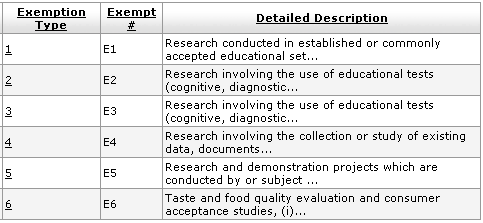Exemption Type
The Exemption Type maintenance document allows you to create and edit standard types of research exemptions used for protocol compliance. It is used to establish and maintain numeric codes and textual description values which are stored in database tables. This data serves as reference information that is made available for display and selection in various areas of the system, including other e-docs.
One of six categories of exempt research specified by the Common Rule (45 CFR 46.101(b). Categories of research (primarily educational, behavioral, social science and research involving existing data, medical records, and pathological specimens) that present little or no risk to the research participants. Research that qualifies for "Exemption from IRB Review" must meet one of six categories outlined in the Common Rule (e.g. 45 CFR 46.101(b) and should not involve vulnerable research participants except under unique situations.
On the Special Review page of the KC Proposal Development e-doc, you select an Exemption Type when the proposal involves human subjects.
|
|
Existing Value Modification: These values are defined by the CFR. |
Document Layout

Figure 1054 Exemption Type Maintenance Document Example Layout
Edit Exemption Type Codes Section
The Edit Exemption Type Codes section of the Exemption Type maintenance document is a unique section that allows you to specify and maintain the details associated with the reference table record in fields. It displays two required fields and one optional field that let you specify each type of exemption to be used for reference and selection in the system.
Table 718 Exemption Type Maintenance Document - Edit Exemption Type Codes Section Field Descriptions
|
Field |
Description |
|
Exemption Type |
Required. Enter a numeric value to uniquely identify the exemption type in the system. Enter the code value that uniquely defines this particular type of exemption in the system for reference and identification. One of six categories of exempt research specified by the Common Rule (45 CFR 46.101(b).
|
|
Exempt # |
Required. Enter an alphanumeric value (for example, E1) to represent the exemption type detail. Enter the alphanumeric characters that serve as the unique number of this individual exemption. One of six categories of exempt research specified by the Common Rule (45 CFR 46.101(b). |
|
Detailed Description |
Enter the full textual description of the
exemption. Enter text that thoroughly explains the purpose and
meaning of the exemption type code. Click within the text box
(or press the tab |
Examples

Figure 1055 Exemption Type Maintenance Document Example Values
Common Features
This maintenance document includes the following features that are common to most KC maintenance documents:
Table 719 Links to Common Maintenance Document Component Instructions
|
Common Maintenance E-Doc Component |
Cross-Reference Links To Usage Instructions |
|
Document Header |
|
|
Document Overview Section |
|
|
Notes and Attachments Section |
|
|
Ad Hoc Recipients Section |
|
|
Route Log Section |
|
|
Action Buttons |
|
Process
|
|
For information about searching for, initiating, editing, copying, submitting, saving, closing, canceling, and/or routing a maintenance document, see “Common Maintenance E-Doc Operations” on page 129 in the Overview section. |


 key from a previous field) to
relocate the cursor to the field, and then type (or paste from virtual
clipboard) to enter text in the box as necessary to provide the
appropriate information. Click the add note
key from a previous field) to
relocate the cursor to the field, and then type (or paste from virtual
clipboard) to enter text in the box as necessary to provide the
appropriate information. Click the add note  icon to view/edit/paste text
in a new browser window, then click the continue button to return to the
text entry field in the document.
icon to view/edit/paste text
in a new browser window, then click the continue button to return to the
text entry field in the document.